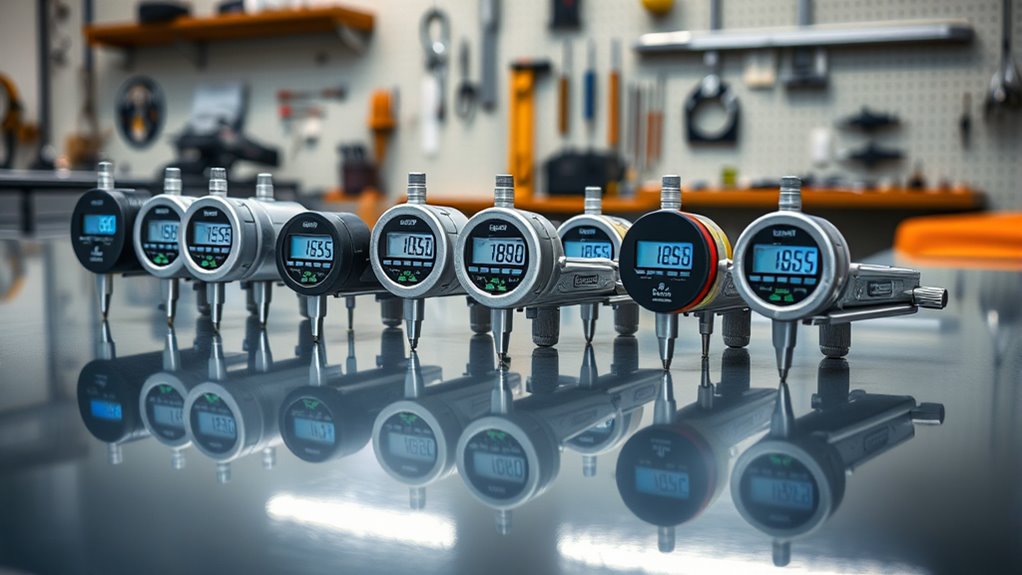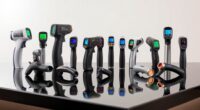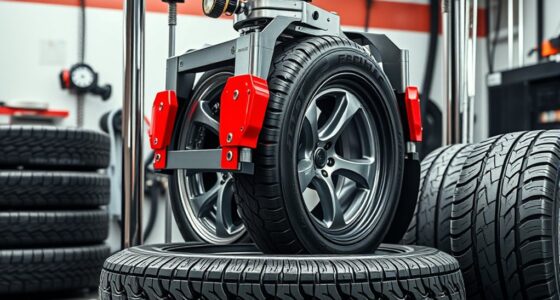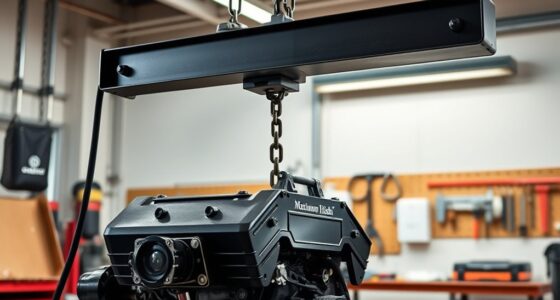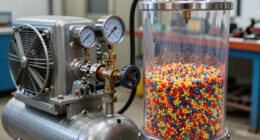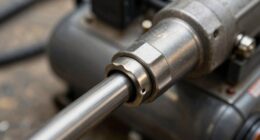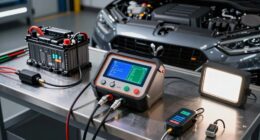If you’re searching for the 15 best professional paint thickness gauges for 2025, I’ve got you covered. These models combine high accuracy, durable build, and user-friendly features, making them ideal for automotive, industrial, and quality control inspections. They offer precise measurements of metallic surfaces and are easy to calibrate. Want to discover which options fit your needs best? Keep going, and I’ll guide you through the top choices for reliable coating assessments.
Key Takeaways
- The list features top-rated digital and mechanical gauges with high accuracy and wide measurement ranges for professional use in 2025.
- Devices include advanced features like data storage, PC connectivity, and automatic substrate recognition for precise, efficient inspections.
- Suitable for automotive, industrial, and quality control applications, primarily measuring metallic surfaces with non-destructive testing.
- Emphasizes durability, ease of operation, and calibration capabilities to maintain measurement accuracy over time.
- The selection covers various price points and specifications to meet different professional needs in paint thickness measurement.
Car Coating Thickness Meter for Used Cars
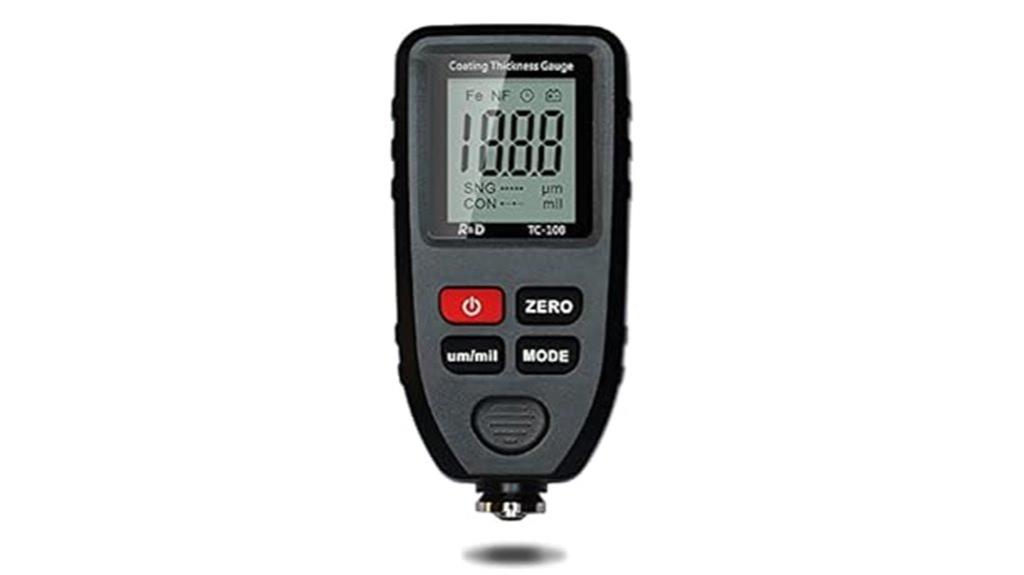
If you’re inspecting used cars for paint quality or hidden repairs, the Car Coating Thickness Meter (model TC100) is an excellent choice. I find it straightforward to use, with a clear display and lightweight design that makes quick measurements easy. It detects paint and coating thickness on steel and aluminum, helping me identify repainting or accident damage. The dual technology ensures accurate readings on ferrous and non-ferrous metals, reducing guesswork. Whether you’re a professional inspector or a DIY enthusiast, this device offers reliable, consistent results—often with 98% accuracy—making it an invaluable tool for evaluating bodywork quality and avoiding costly mistakes.
Best For: used car buyers, professional inspectors, and automotive enthusiasts seeking accurate, quick paint thickness measurements to assess bodywork quality and detect repairs or repainting.
Pros:
- Easy to operate with a clear display and lightweight design for quick measurements
- Accurate dual-technology detection on ferrous and non-ferrous metals, often achieving 98% accuracy
- Versatile for measuring paint thickness on various surfaces including steel, aluminum, and coatings on furniture or appliances
Cons:
- Cannot measure non-metallic surfaces such as plastic, fiberglass, or wood
- Battery placement issues may cause movement or accidental shutdown if not handled carefully
- Requires practice to master nuances of automotive paint and avoid errors in measurement
Digital Coating Thickness Gauge Industrial-818 Paint Meter with PC Connection
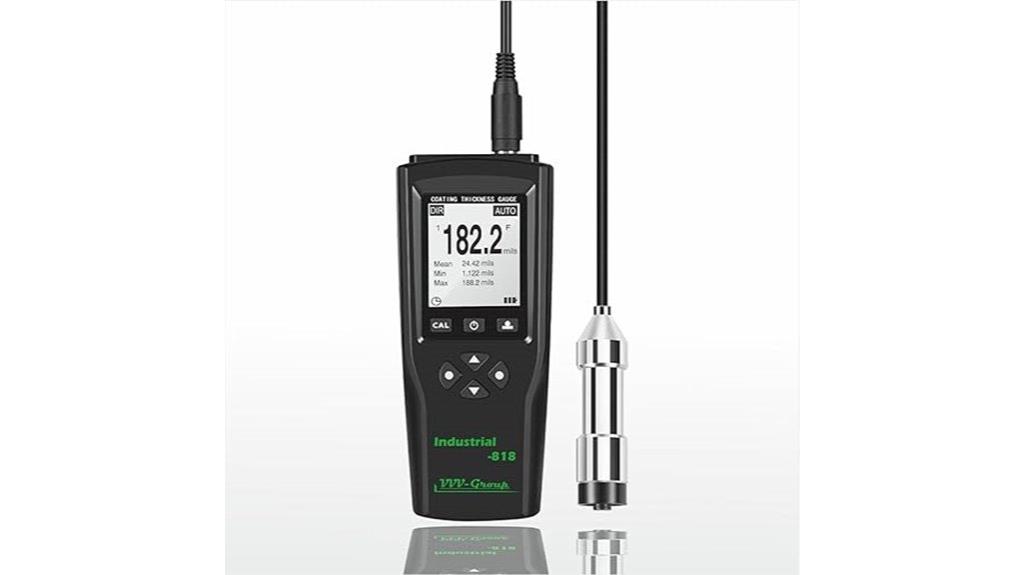
The Digital Coating Thickness Gauge Industrial-818 Paint Meter with PC Connection is an excellent choice for professionals who need precise, non-destructive measurements across a variety of metal surfaces. It measures coatings on ferrous and non-ferrous metals with a range of 0–197 mils (0–5000 µm), suitable for paint, powder coating, plating, and anodizing. Its dual measurement technology ensures accurate readings by automatically identifying the substrate. The device features an advanced ruby-tipped sensor for durability, supports multiple units, and easily connects to a PC for data transfer. Its rugged, ergonomic design makes it ideal for industrial environments and quality control applications.
Best For: industrial professionals and quality control specialists needing precise, non-destructive coating thickness measurements on ferrous and non-ferrous metal surfaces.
Pros:
- Accurate measurements with a resolution of 0.001 mils and less than ±3% deviation.
- Dual measurement technology automatically identifies substrate type for reliable readings.
- Durable, shock-resistant design with PC connectivity for easy data management.
Cons:
- Limited to measuring coatings up to 197 mils (5000 µm), which may not suit all applications.
- Requires familiarity with multiple measurement units for optimal use.
- Potentially higher cost compared to basic coating thickness gauges.
Coating Thickness Gauge CM-208Z
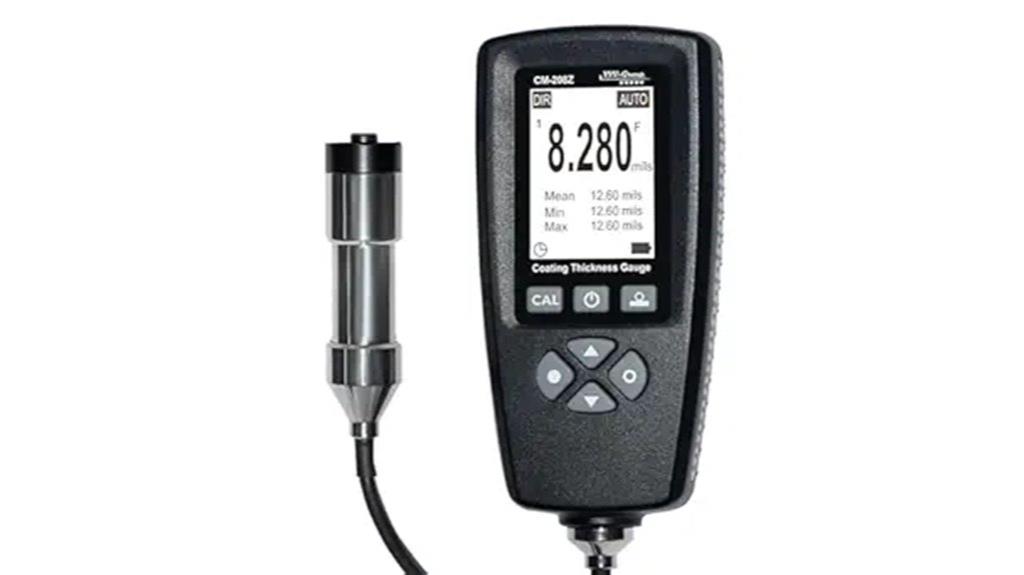
The Coating Thickness Gauge CM-208Z stands out as an ideal choice for professionals needing precise measurements across a variety of surfaces. It offers a measurement range of 0-120 mils (0-3000 µm) with high resolution—0.001 mils up to 10 mils, then 0.01 mils above that—ensuring detailed accuracy. Its professional-grade precision has a deviation of less than 2%, supporting measurements in mils, microns, and millimeters. Equipped with a high-precision remote sensor, it works reliably on hard-to-reach and complex surfaces, including ferrous and non-ferrous metals. Its rugged, ergonomic design makes it perfect for field or lab use in automotive, industrial, and coating inspections.
Best For: professionals and technicians requiring precise, reliable coating thickness measurements on a variety of metal surfaces in industrial, automotive, or quality control settings.
Pros:
- High measurement accuracy with deviation less than 2% for reliable results
- Wide measurement range of 0-120 mils (0-3000 µm) suitable for various applications
- Compatible with ferrous and non-ferrous metals, including hard-to-reach and complex surfaces
Cons:
- May be more expensive than basic coating thickness gauges due to professional-grade features
- Requires familiarity with digital interfaces for optimal use, which might be challenging for beginners
- The sensor and device need careful handling to maintain precision and durability
KAIWEETS Paint Thickness Gauge for Cars
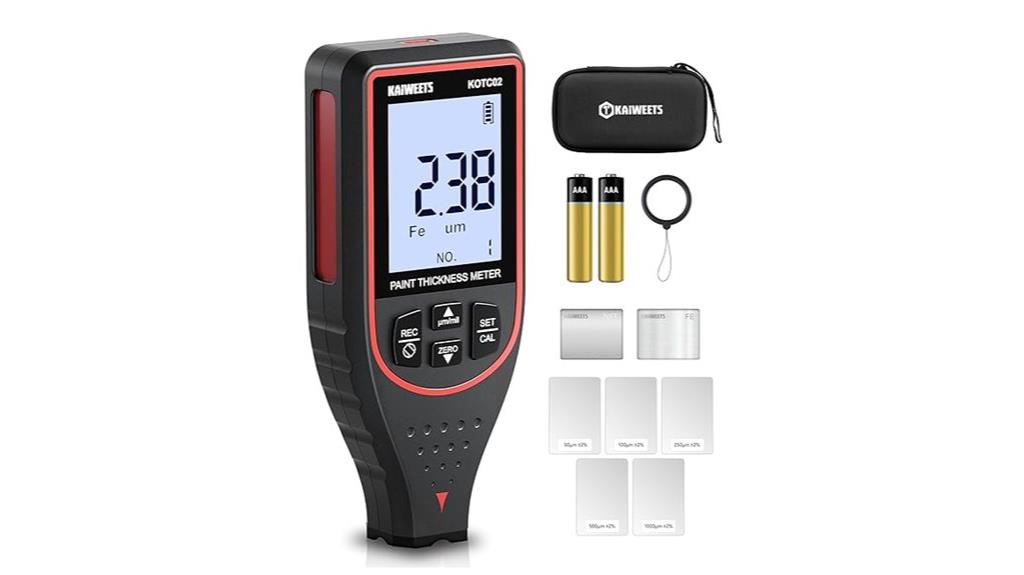
Designed for automotive professionals and enthusiasts alike, the KAIWEETS Paint Thickness Gauge offers quick, accurate measurements by automatically distinguishing between ferrous and non-ferrous metals. It’s factory-calibrated and features Zero Point and Multi-Points calibration modes, ensuring reliable readings across various surfaces. With an impressive measurement range of 0-2999 μm, it suits car inspections and repair work. The large, rotatable backlit display makes readings clear from any angle, even in low light. Its portable, ergonomic design includes storage and supports data storage for up to 30 measurements. Overall, it’s a versatile, user-friendly tool perfect for detecting over-painting or repainting in automotive applications.
Best For: automotive professionals, car enthusiasts, and collision repair shops seeking quick, accurate paint thickness measurements.
Pros:
- Automatically distinguishes ferrous and non-ferrous metals for precise readings
- Large, rotatable backlit display for easy visibility in any environment
- Supports data storage of up to 30 measurements and features calibration options
Cons:
- May require calibration after heavy use or in certain environments
- Limited to measurements up to 2999 μm, which might not suit industrial coatings
- Requires batteries, which need replacement or recharging over time
Paint Thickness Gauge CM-205FN for Cars
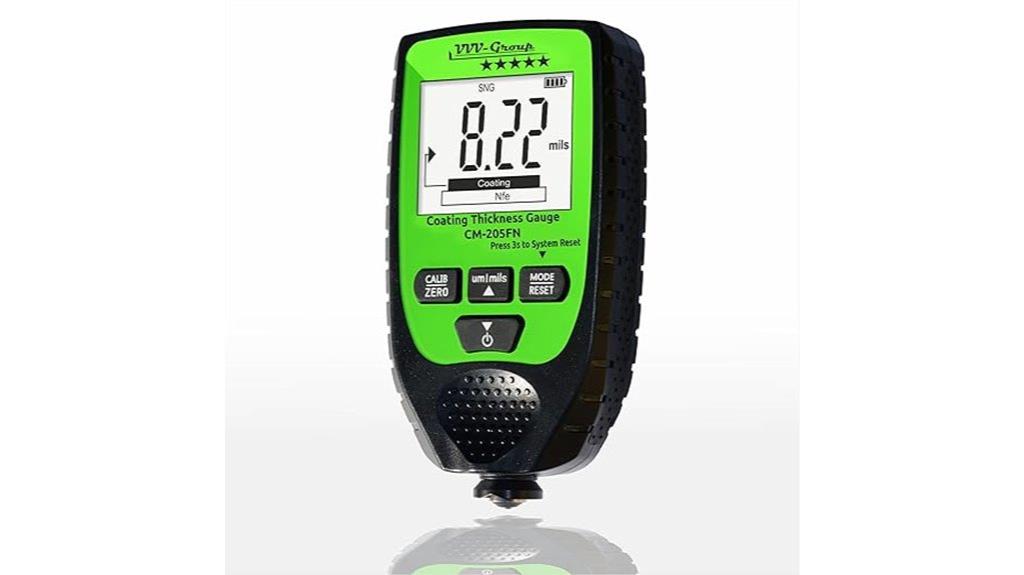
If you’re in the automotive industry or a dedicated car enthusiast, the Paint Thickness Gauge CM-205FN stands out as an essential tool for accurate, fast measurements on metal surfaces. It delivers precise readings on steel, iron, and aluminum, helping you detect repainting, body filler, or previous repairs quickly. The digital display shows measurements in mils or microns, with a resolution of 0.1 μm/0.01 mil and ±3% accuracy. Its user-friendly design, automatic substrate recognition, and durable Teflon-coated sensor make it reliable for professional inspections, detailing, or bodywork. Whether in a workshop or on the lot, this gauge guarantees confident, accurate assessments every time.
Best For: automotive professionals, body shops, car enthusiasts, and detailers seeking quick, accurate paint thickness measurements on metal surfaces.
Pros:
- Provides fast, precise readings with 0.1 μm/0.01 mil resolution and ±3% accuracy
- Automatically recognizes ferrous and non-ferrous substrates for reliable results
- Durable Teflon-coated sensor ensures long-term wear resistance and consistent performance
Cons:
- Not suitable for measuring non-metal materials like plastic or carbon fiber
- Requires calibration when switching between different types of metals for optimal accuracy
- May be less effective in extremely high humidity or very low temperatures outside specified operating range
Paint Thickness Gauge CM-224Auto 2025 Digital Paint Depth Meter
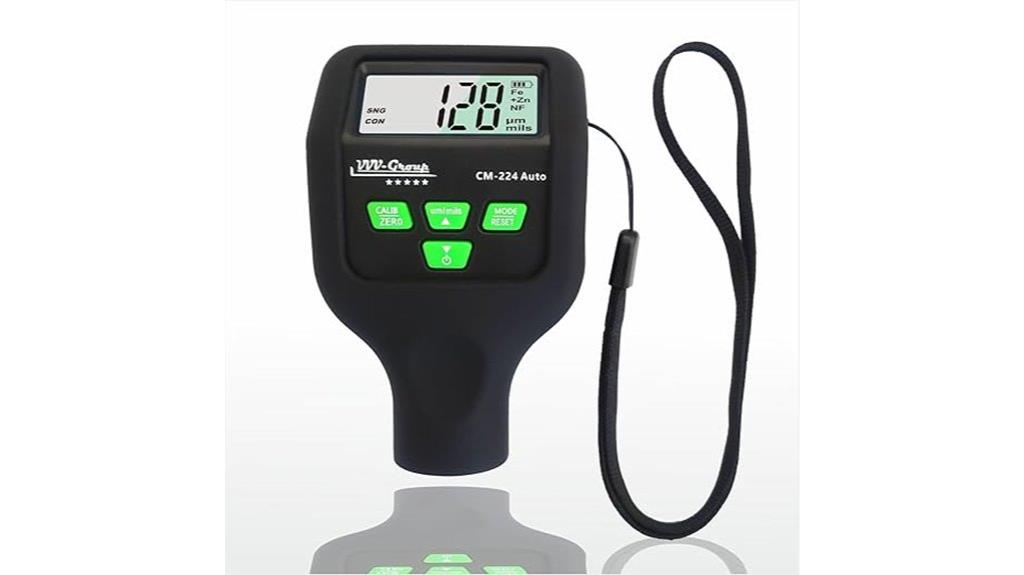
For professionals who need quick, accurate measurements of paint thickness on metal surfaces, the CM-224Auto 2025 Digital Paint Depth Meter stands out as an excellent choice. It measures coatings from 0 to 1500 μm with 0.1 μm resolution and ±3% accuracy, making it reliable for detailed assessments. Its automatic detection of ferrous and non-ferrous metals simplifies testing, especially on galvanized or mixed-metal surfaces. The device features auto calibration and a durable shock-resistant case, ensuring longevity and consistent performance. Its large backlit display and ergonomic design allow for easy use in various lighting conditions and environments, making it ideal for automotive, manufacturing, and industrial inspections.
Best For: professionals and enthusiasts seeking quick, accurate paint thickness measurements on metal surfaces in automotive, manufacturing, and industrial settings.
Pros:
- High precision with 0.1 μm resolution and ±3% accuracy.
- Automatic detection of ferrous and non-ferrous metals simplifies testing.
- Durable shock-resistant case and ergonomic design ensure reliable performance in various environments.
Cons:
- Not suitable for measuring plastics or carbon fiber surfaces.
- Limited to metal surfaces, restricting its versatility for non-metal applications.
- Requires calibration and familiarity with settings for optimal results.
Paint Thickness Gauge for Used Car Buyers
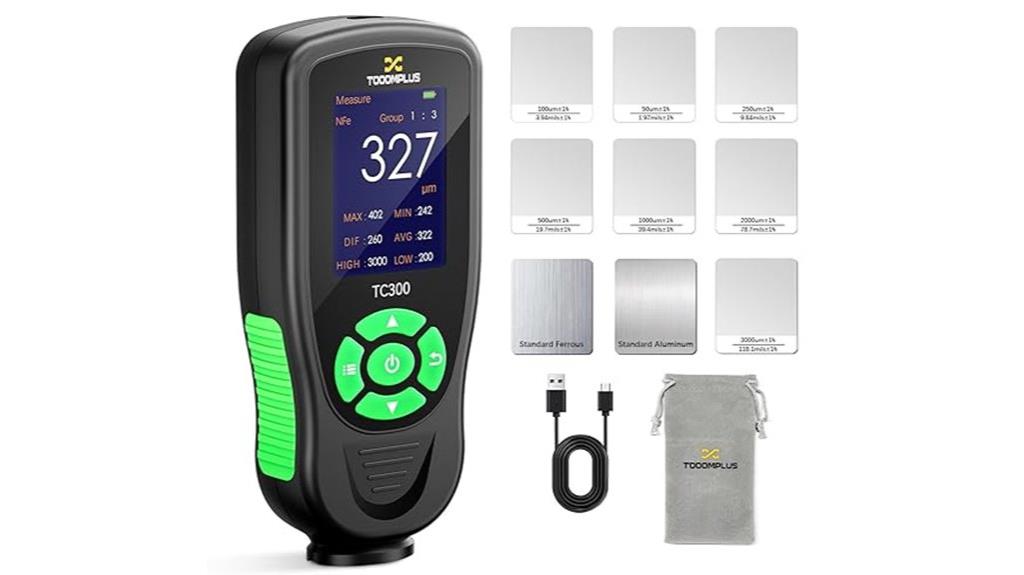
A professional paint thickness gauge is an invaluable tool for used car buyers who want to verify a vehicle’s true condition quickly and accurately. It provides fast, lab-grade measurements within 0.5 seconds by averaging multiple data points, ensuring reliability. With a range up to 3000μm and easy calibration, it detects paint thickness on various metals like steel and aluminum, thanks to dual-mode technology. Its compact, user-friendly design makes it ideal for on-the-spot inspections, helping buyers identify repainting, repairs, or hidden damage. Overall, it’s a vital device for evaluating a used car’s true paint condition and avoiding costly surprises.
Best For: used car buyers, automotive professionals, and inspectors seeking quick, accurate paint thickness measurements to assess vehicle condition and uncover hidden repairs or repainting.
Pros:
- Provides fast, lab-grade accuracy within 0.5 seconds by averaging multiple readings
- Wide measurement range up to 3000μm with straightforward calibration for precise results
- Employs dual-mode technology to automatically distinguish ferrous from non-ferrous metals, ensuring reliable measurements on various substrates
Cons:
- Requires proper technique, such as keeping the gauge at least two inches from the surface, for optimal accuracy
- Slightly more expensive than basic gauges, which could be a consideration for hobbyists
- Recalibration may be necessary over time to maintain peak accuracy, especially when measuring on different metal types
Paint Thickness Gauge for Cars
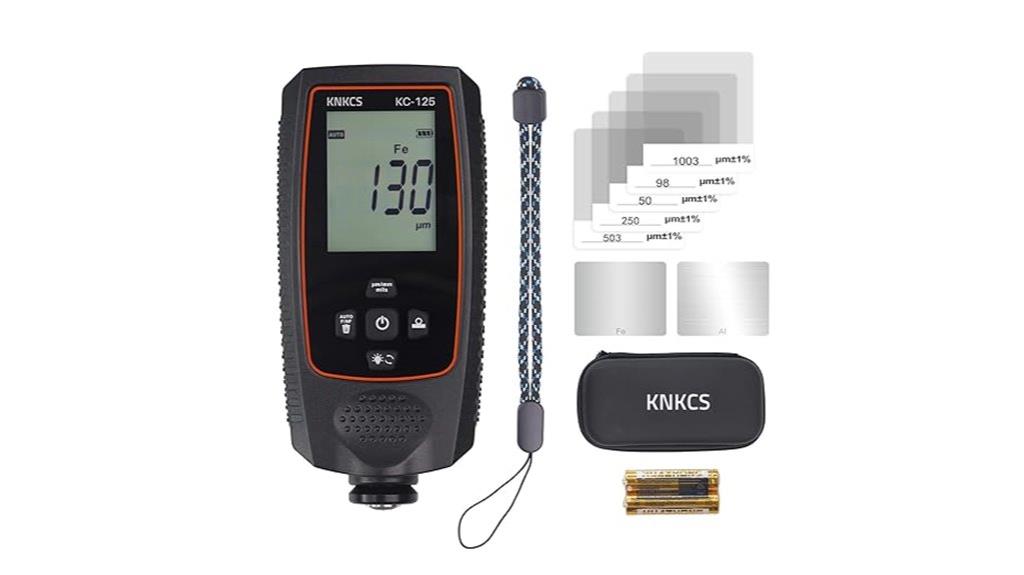
The KNKCS Digital Auto Paint Thickness Gauge KC-125 stands out as an essential tool for automotive professionals who demand high precision and versatility. With an accuracy of ±(3% + 1μm) and a resolution of 0.1μm, it covers a measurement range up to 2000μm, making it perfect for evaluating paint layers on cars. Its advanced detection can identify iron powder filler and coated substrates, helping detect hidden repairs or overpaint. The gauge supports continuous measurements, with a rotating screen for easy use. Whether for auto body repairs, inspections, or quality control, this device ensures reliable, detailed paint assessments, making it a must-have for car professionals.
Best For: automotive professionals, auto body shops, and used car inspectors seeking precise paint thickness and material detection.
Pros:
- High measurement accuracy of ±(3% + 1μm) for reliable results
- Wide measurement range up to 2000μm suitable for various coatings
- Advanced detection capabilities for identifying iron powder filler and coated substrates
Cons:
- May require calibration for optimal performance in specific environments
- Slightly complex operation for beginners without prior experience
- Battery life could be limited with continuous use in outdoor settings
Paint Thickness Gauge, Car Paint Inspection Tool
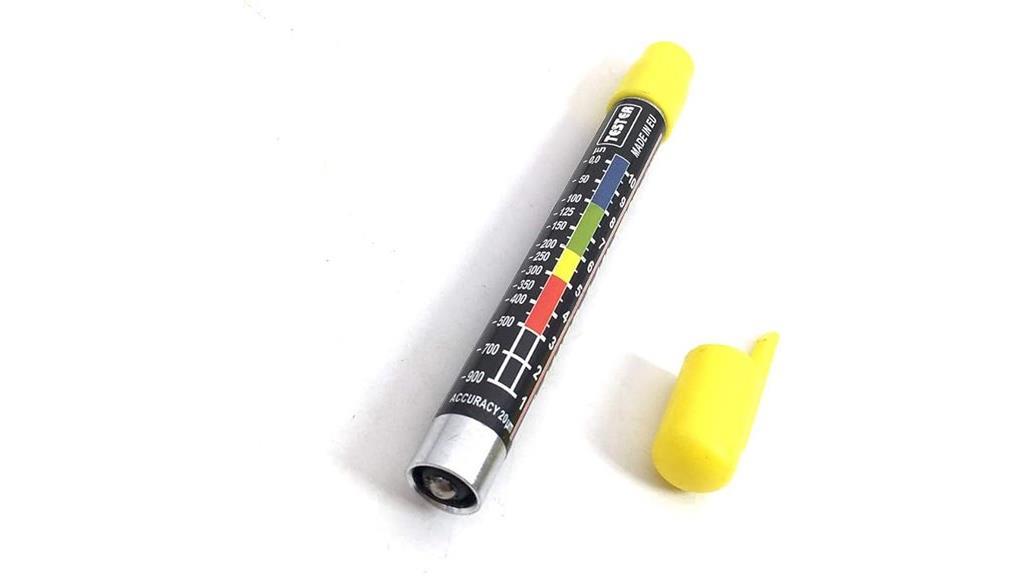
If you need an accurate and portable way to inspect vehicle paint, the Paint Thickness Gauge is an ideal choice. Its compact pen-shaped design makes it easy to carry and use anywhere, perfect for quick inspections or detailed evaluations. The magnetic tip reaches curved surfaces and hard-to-access areas, ensuring precise measurements. With a mechanical, water-resistant gauge that requires no batteries, you can use it in rain or dirty environments without worry. It features a colored micron-scale for detailed readings, revealing hidden damages or previous paintwork. This reliable, durable tool helps me assess vehicle paint layers quickly and accurately during inspections or when shopping for used cars.
Best For: vehicle owners, car inspectors, and dealerships seeking quick, accurate, and portable paint inspection tools for assessing vehicle condition and detecting previous damages.
Pros:
- Compact, portable pen-shaped design for easy handling and on-the-go use
- Magnetic tip allows access to curved and hard-to-reach surfaces for precise measurements
- No batteries required; water-resistant mechanical gauge suitable for various environments
Cons:
- Mechanical gauges may require calibration for optimal accuracy over time
- Limited to measuring paint and metal thickness; does not provide digital or stored measurement data
- Manual readings might be less convenient for users preferring digital records or detailed analysis
EMVANV Paint Thickness Gauge, Digital Meter with LCD Display
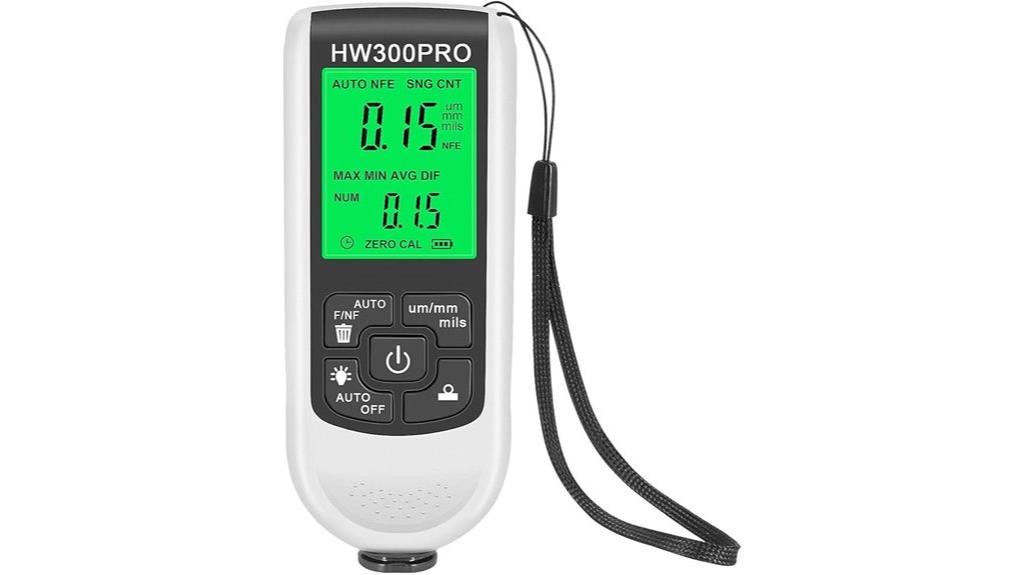
For professionals needing precise and reliable coating measurements, the EMVANV Paint Thickness Gauge stands out with its high-accuracy digital LCD display and ultra-precision resolution of 1μm. It measures coatings up to 2000μm on various substrates like steel, aluminum, and copper, including paint, enamel, chrome, and anodized layers. The device features automatic substrate detection, ensuring accurate readings across different materials. Its portable design includes a wrist strap for convenience and a large, HD display that makes reading easy in any environment. Whether in a lab, workshop, or outdoor setting, this gauge delivers stable, precise measurements essential for quality control and inspection.
Best For: professionals in manufacturing, metal processing, and quality inspection requiring precise, reliable coating thickness measurements across various substrates and environments.
Pros:
- High accuracy with an ultra-precision resolution of 1μm for detailed measurements
- Wide measurement range up to 2000μm suitable for multiple coating types and substrates
- Portable design with wrist strap and large LCD display for ease of use in diverse settings
Cons:
- May require calibration for optimal accuracy on certain materials
- Limited to coatings within the 0-2000μm range, not suitable for thicker layers
- Dependence on battery power, which may require frequent replacements or recharging
AstroAI Paint Thickness Gauge for Cars

Looking for a reliable paint thickness gauge that delivers precise, non-destructive measurements? The AstroAI Paint Thickness Gauge for Cars is an excellent choice. Its automatic detection technology identifies substrates and measures thickness without damage, with a range of 0-1500μm and a resolution of 0.01μm for high accuracy. The device features a four-way rotating, high-resolution backlit color screen, making readings easy in any lighting. It also offers limit alarms, data storage for up to 8 sets of 32 points, and supports simple data review. Perfect for checking original coatings and quality control, this gauge is a versatile tool for automotive professionals.
Best For: automotive professionals and car enthusiasts seeking precise, non-destructive paint thickness measurements for quality control and inspection.
Pros:
- High-precision measurement with a range of 0-1500μm and resolution of 0.01μm for accurate results
- Fully rotating, high-resolution backlit color screen for easy readability in various lighting conditions
- Large data storage capacity with easy review and visualization features for efficient analysis
Cons:
- May require calibration for optimal accuracy in different environments
- Slightly more complex interface might need some familiarization for new users
- Battery life could be limited with extensive use without frequent recharging
Digital Coating Thickness Gauge CM-218 Paint Depth Meter for Car and Industrial

The Digital Coating Thickness Gauge CM-218 stands out as an essential tool for professionals who need precise measurements across various materials. It offers high accuracy with 0.01 mil resolution and measures up to 51 mils (1300 µm). The gauge automatically detects ferrous and non-ferrous substrates like steel, iron, and aluminum, ensuring reliable readings. Its versatile design suits automotive, industrial, aerospace, and laboratory use. The bright, color display with LED backlight and 4-way rotation makes it easy to read in any position. With data storage for 1500 readings and a rechargeable battery, it’s a reliable, user-friendly device for accurate, efficient coating inspection.
Best For: professionals and technicians in automotive, industrial, aerospace, and laboratory fields who require precise coating thickness measurements across various materials.
Pros:
- High accuracy with 0.01 mil resolution and a measurement range up to 51 mils (1300 µm)
- Automatic detection of ferrous and non-ferrous substrates for reliable readings
- User-friendly with a high-resolution color display, LED backlight, and 4-way rotation for easy viewing
Cons:
- Requires regular charging via USB, which may be inconvenient in some field scenarios
- Limited to 1500 stored readings; may be insufficient for extensive data collection needs
- The device’s precision may be affected if not calibrated properly or used on excessively rough surfaces
TCP Global Wet Film Thickness Gauge Comb (Pack of 3)
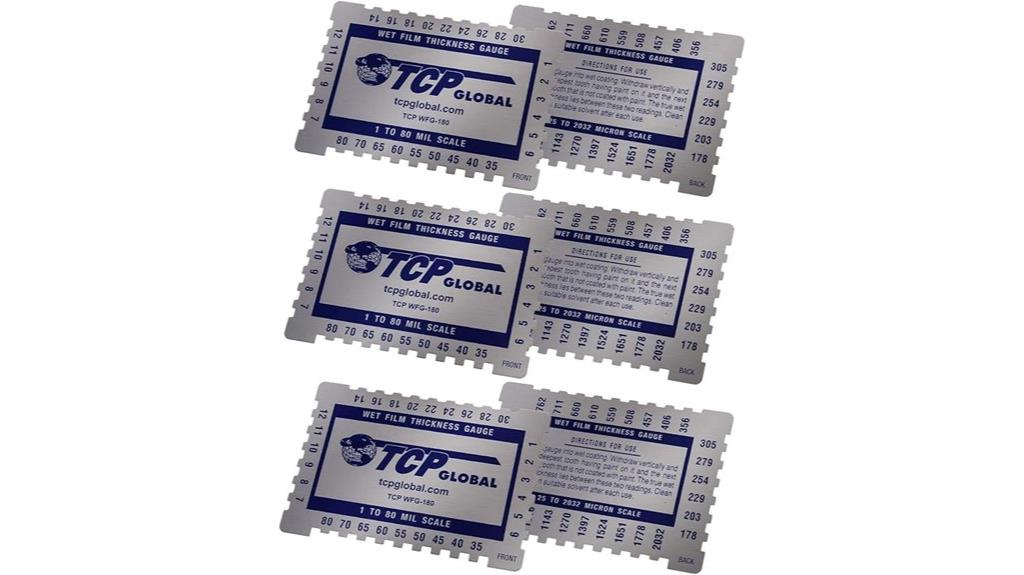
The TCP Global Wet Film Thickness Gauge Comb (Pack of 3) stands out as an essential tool for professionals who need quick, accurate measurements of coating thickness immediately after application. Its 1-80 mil scale, with notched comb teeth, allows for precise assessment of wet films on paints, resins, varnishes, and more. Designed for convenience, it simplifies quality control by ensuring proper coating thickness and consistency across various substrates. The pack of three gauges offers flexibility and durability, making it easy to handle multiple projects. Whether for industrial or DIY use, this tool provides reliable readings that help maintain high standards in coating application.
Best For: professionals and DIY enthusiasts seeking quick, accurate measurement of wet film thickness for paints, resins, lacquers, varnishes, and powder coatings.
Pros:
- Provides precise measurements from 1 to 80 mils for accurate coating thickness assessment
- Notched comb teeth design makes it easy to read and use immediately after application
- Pack of three gauges offers durability and flexibility for multiple projects
Cons:
- May require calibration for highly specialized coatings or substrates
- Not suitable for measuring dry film thickness once coatings have cured
- The notched design might be less effective on uneven or textured surfaces
EC-500AZ Paint Thickness Gauge for Cars
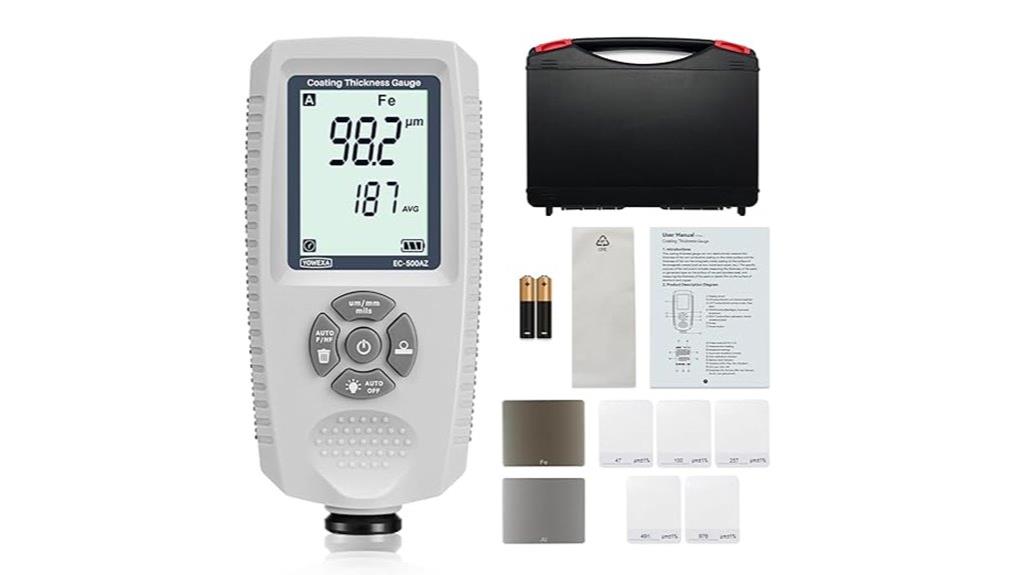
If you’re inspecting a vehicle for repainting or bodywork, the EC-500AZ Paint Thickness Gauge stands out as an ideal tool thanks to its quick, automatic surface recognition. It measures coatings up to 1500μm with impressive accuracy and 0.1μm resolution, making it reliable for detailed inspections. Its built-in sensors automatically identify ferrous, non-ferrous, and zinc-coated surfaces, saving you time and effort. With fast operation—up to two readings per second—and features like AVG, MAX, and MIN stats, it provides consistent results. Lightweight and durable, it’s perfect for automotive, industrial, and DIY projects, ensuring precise, non-destructive coating measurements every time.
Best For: automotive professionals, auto detailers, and DIY enthusiasts seeking quick, accurate coating thickness measurements for vehicle inspections and repairs.
Pros:
- Automatic surface recognition saves time and reduces user effort
- High accuracy with ±(3%+1μm) precision and 0.1μm resolution
- Fast operation with up to 2 readings per second and reliable statistics (AVG, MAX, MIN)
Cons:
- Battery life could be improved for extended use
- Calibration plate durability may be a concern over time
- Lacks a protective case for easier storage and transportation
Paint Thickness Gauge CM-206X for Automotive Inspection
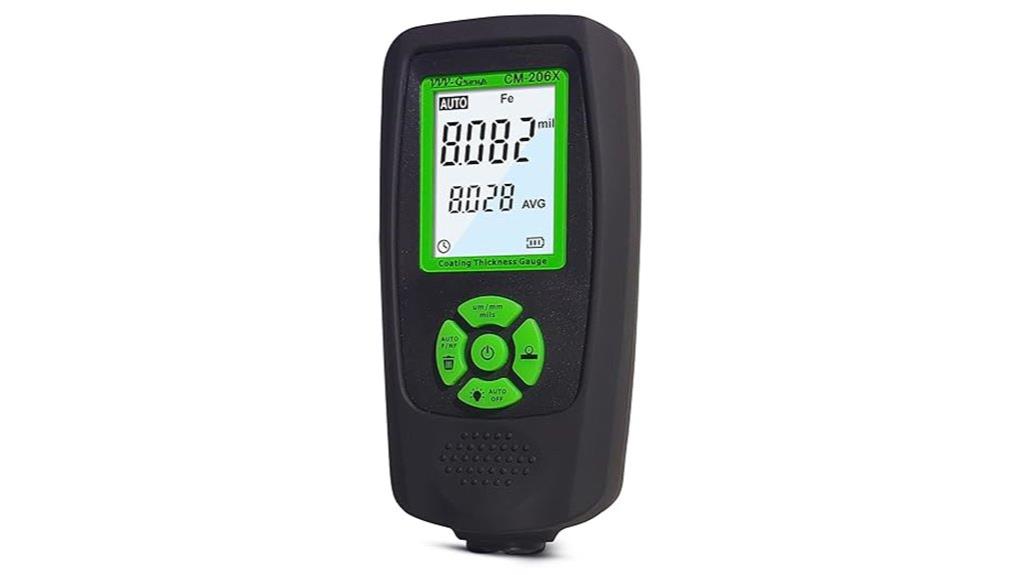
Paint Thickness Gauge CM-206X stands out as an essential tool for automotive professionals who need precise and reliable measurements during inspections. I’ve found it invaluable for detecting damaged, repainted, or puttied panels, ensuring accurate evaluations of a vehicle’s body. Its resolution of 0.001 mils offers high precision, and it recognizes ferrous, non-ferrous, and galvanized metals, supporting multiple units. The advanced ruby probe prevents scratches, while the self-adjusting head makes measurements quick and easy. With temperature compensation and durable construction, it performs consistently in various conditions. Whether inspecting used cars or verifying paint safety, this gauge provides fast, trustworthy results that boost confidence during every assessment.
Best For: automotive professionals, car inspectors, and detailers seeking precise, reliable paint thickness measurements for vehicle inspections.
Pros:
- High precision with 0.001 mil resolution for accurate readings
- Recognizes ferrous, non-ferrous, and galvanized metals, supporting multiple units
- Durable construction with a protective ruby probe and temperature compensation for consistent performance
Cons:
- May require familiarity with measurement units for optimal use
- Slightly higher cost compared to basic gauges, but justified by features
- Needs proper handling to avoid damage to the sensitive probe during rough conditions
Factors to Consider When Choosing Professional Paint Thickness Gauges
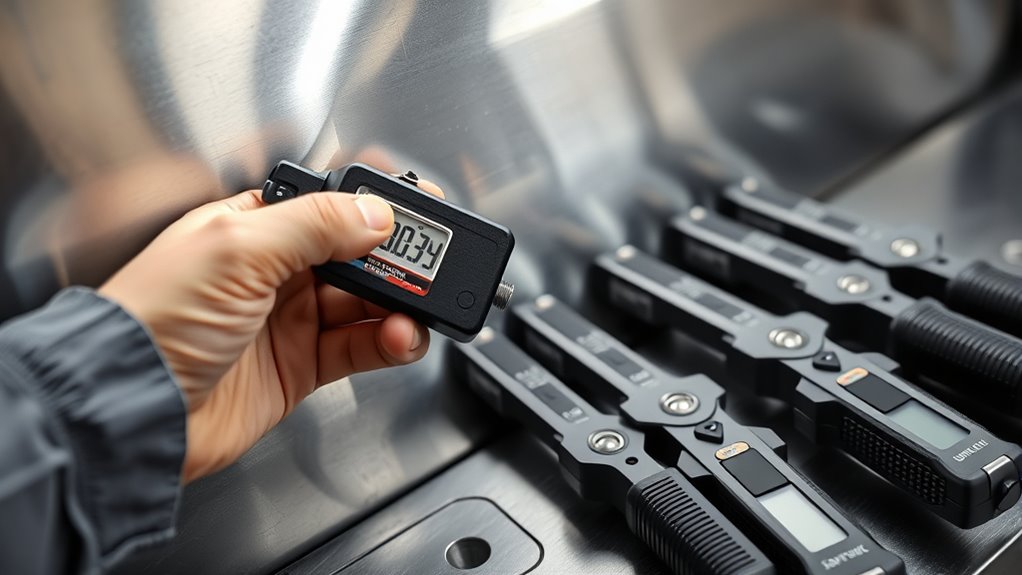
When selecting a paint thickness gauge, I focus on the measurement range and how well it fits my needs. I also consider how compatible it is with different substrates, along with its calibration accuracy and ease of use. Finally, I look at its durability and build quality to ensure it withstands regular use.
Measurement Range Options
Choosing the right measurement range is essential for getting accurate paint thickness readings. Measurement range options vary from as low as 0–51 mils (1300 µm) to as high as 0–3000 μm (118 mils), impacting their suitability for different coatings. Picking the correct range guarantees you’re capturing both thin and thick coatings accurately, minimizing errors. A wider range provides versatility, allowing you to handle various substrates and coating types, such as automotive or industrial applications. Some gauges offer adjustable or multiple ranges, giving you flexibility for detailed inspections and specific project needs. Matching the device’s measurement range to your expected coating thickness is key to reliable results, ensuring precision whether you’re working on delicate finishes or thick industrial layers.
Substrate Compatibility Features
Ensuring that a paint thickness gauge can accurately recognize different metal substrates is vital for reliable measurements. I look for devices that automatically identify ferrous and non-ferrous metals, guaranteeing precise readings across various materials. Compatibility with steel and aluminum is essential, especially for comprehensive inspections. An automatic substrate detection feature reduces user error and speeds up testing. I also verify that the measurement technology—such as magnetic induction for ferrous metals or eddy current for non-ferrous metals—is suitable for my needs. It’s important to note that some gauges aren’t compatible with non-metallic surfaces like plastic, fiberglass, or wood, which limits their versatility. Choosing a device with these substrate compatibility features ensures accurate, efficient measurements in diverse industrial and automotive applications.
Calibration and Accuracy
Calibration and accuracy are the cornerstones of reliable paint thickness measurements, so I always prioritize gauges that offer straightforward calibration options. Proper calibration ensures measurements are precise, with deviations typically less than 3%, which is vital for detecting repainting or repairs. Professional gauges often feature zero-point and multi-point calibration, allowing me to verify and adjust readings easily. Regular recalibration is essential, especially after impacts or extensive use, to maintain accuracy over time. High-quality gauges may include automatic calibration functions or simple manual procedures, making ongoing adjustments hassle-free. Using standardized calibration samples or plates helps me confirm that my device remains accurate. Ultimately, choosing a gauge with stable calibration features guarantees consistent, trustworthy measurements in my work.
Ease of Use
A user-friendly paint thickness gauge makes my work much easier by providing a clear digital display and simple controls that allow for quick readings. Intuitive interfaces, like large buttons and backlit screens, help me work efficiently in various lighting conditions. Devices with automatic substrate recognition and calibration streamline the process, reducing errors and making them accessible even for beginners. The lightweight, ergonomic design minimizes fatigue during extended use or in tight spaces, improving comfort and precision. Features such as rotatable displays and straightforward measurement procedures, including zero-point and multi-point calibration, ensure I get accurate results without needing extensive technical knowledge. Overall, ease of use is vital for reliable, efficient measurements, especially in fast-paced or challenging work environments.
Durability and Build
When selecting a professional paint thickness gauge, durability and build quality are essential because they determine how well the device withstands daily use and harsh conditions. A sturdy housing made from impact-resistant materials like ABS plastic or rubberized coatings helps it resist drops and rough handling. High-quality probes with sapphire or ruby tips ensure longevity by resisting wear and maintaining accuracy over time. An IP65 or higher rating indicates protection against dust and water, making it suitable for outdoor or industrial environments. Additionally, resistance to humidity, temperature changes, and corrosion guarantees consistent performance. Features like reinforced cables, secure battery compartments, and shock-absorbing elements further extend the device’s lifespan, ensuring reliability in demanding conditions and reducing the need for frequent replacements.
Data Storage Capabilities
Durability and build quality guarantee that a paint thickness gauge can withstand tough working conditions, but having robust data storage capabilities is equally important for effective surface analysis. A good gauge can record multiple readings, allowing for thorough inspections over time. Storing at least 100 measurement groups helps track trends and compare surfaces easily. Features like automatic saving, straightforward export options, and compatibility with PC software streamline documentation and reporting. This data storage is essential for verifying consistency across panels, detecting repairs, or spotting repainting. Advanced models also offer data visualization, charts, and statistical summaries, enhancing analysis accuracy and decision-making. Overall, solid data storage features ensure your measurements are well-organized, accessible, and useful for comprehensive surface evaluation.
Price and Warranty
Choosing the right paint thickness gauge involves balancing cost and reliability. Prices vary widely, from affordable models around $30 to professional-grade devices over $300. Higher-end gauges usually offer better accuracy, durability, and additional features, making them worth the investment for serious users. Warranties are equally important; many reputable gauges come with 1 to 3-year coverage, which signals confidence in their build quality. Longer warranties, like 3 years or more, provide peace of mind and protect you from costly repairs or replacements. On the other hand, budget models may have limited or no warranties, risking long-term reliability issues. Investing in a gauge with a solid warranty can save money over time and guarantee consistent performance during frequent or professional use.
Frequently Asked Questions
How Do Professional Paint Thickness Gauges Improve Vehicle Resale Value?
Using a professional paint thickness gauge helps me verify a vehicle’s paint job, ensuring it’s within factory standards. When I buy or sell a car, I can confidently show potential buyers that the vehicle hasn’t been repainted or damaged, which boosts its resale value. It also helps me avoid vehicles with hidden issues, saving me money and giving buyers peace of mind, ultimately making my transaction more trustworthy and valuable.
What Maintenance Is Required to Ensure Gauge Accuracy Over Time?
To keep my paint thickness gauge accurate, I regularly clean the sensor with a soft cloth and avoid harsh chemicals. I also calibrate it using standard calibration plates recommended by the manufacturer, especially after accidental drops or rough handling. Storing the gauge in a protective case and keeping it away from extreme temperatures helps maintain its accuracy over time. Consistent maintenance ensures reliable readings every time I use it.
Are There Specific Calibration Standards for Different Paint Types?
Yes, there are specific calibration standards for different paint types. I always verify my gauge is calibrated according to the manufacturer’s guidelines for each paint type I work with. This involves using standard calibration blocks or plates that match the coating material. Regular calibration checks are essential, especially when switching between different paints or working in varying environmental conditions, to maintain measurement accuracy and reliable results.
Can Professional Gauges Measure Coatings on Non-Metallic Surfaces?
Yes, professional gauges can measure coatings on non-metallic surfaces, but it depends on the device. I’ve found that some models are specifically designed for non-conductive materials like plastics or composites, using different measurement principles such as ultrasonic or eddy current techniques. Always check the specifications to verify the gauge suits your surface type. Proper calibration for non-metallic surfaces is essential for accurate readings.
What Training Is Recommended for Accurate Use by Beginners?
For beginners, I recommend starting with hands-on training or tutorials offered by manufacturers. Practice using the gauge on different surfaces to get a feel for readings. It’s also helpful to read the user manual thoroughly and watch instructional videos online. Don’t hesitate to ask experienced users for tips. With consistent practice, you’ll become confident in taking accurate measurements and understanding what the readings mean for your project.
Conclusion
Choosing the right paint thickness gauge can truly enhance your inspection process, making it a smoother experience. With so many options available, you’ll find one that fits your needs perfectly. Remember, the right tool isn’t just about precision—it’s about feeling confident in your results. I hope this guide helps you find that ideal gauge, turning what might seem complex into a straightforward, even enjoyable, task. Happy measuring!
